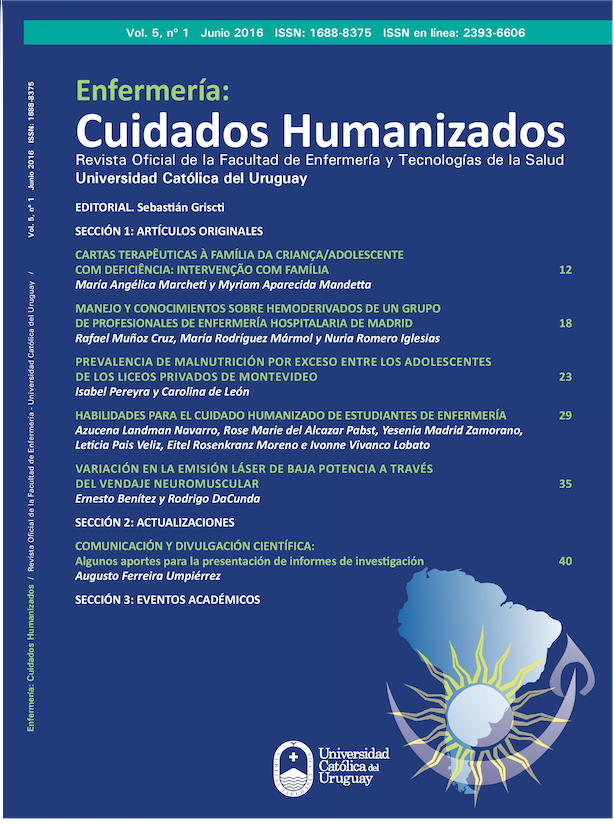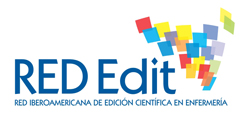SKILLS REQUIRED BY NURSING STUDENTS TO PROVIDE HUMANIZED CARE
DOI:
https://doi.org/10.22235/ech.v5i1.1190Keywords:
education, empathy, nursing, clinical competence.Abstract
Training of nursing students should enhance their skills to provide proper care, linking experience, scientific knowledge, technical skills, values and motivation to work with and for others. There is a risk of dehumanization due to administrative and technical health centers institutional models. Humanized care tends to develop a transpersonal relationship, considers values and higher needs of people who go through the process of health, disease and dignified death. The aim of this study was to identify skills to provide humanized care from the perspective of students. It is a descriptive cross-sectional study with a population of 98 nursing students of 3rd and 4th year (n = 57; 3rd = 20; 4th = 37) whose consent was requested, and also the authorization of the school authorities. The instrument used was the Care Ability Inventory (CAI), which measures the areas of Knowledge, Courage and Patience corresponding to a value of Cronbach α of 0.74. Statistics like frequency distribution, mean, average and percentages were used (Software SPSS-15). The results show a score of 63% in Patience, 35% Knowledge and only 2% in Courage. Patience requires the exercise of tolerance, respect and adaptation to situational uncertainty, generating a close link between the person and the student; this ability scored the highest. Knowledge includes self-knowledge and knowledge of others; it is less developed, causing a breach in the act of caring. The low value in Courage shows the difficulty in facing the unknown and in one’s ability to care, negatively influencing the development of the necessary strength to face proper care. These results show the need to strengthen nursing
students coping skills to everyday situations, especially the dimensions of Knowledge and Courage.
Downloads
References
Casate J, Corrêa K. A humanização do cuidado na formação dos profissionais de saúde nos cursos de graduação. Rev. Esc. Enferm. USP [Internet]. Feb 2012 [citado 30 Abr 2016]; 46 (1): 219-226. Disponible en: http:// www.scielo.br/scielo.php?script=sci_arttext&pid=S0080
&lng
Garavito A. La formación integral de estudiantes de enfermería.
Investig. Enferm. Imagen Desarr. 2013;15(2):153-172.
Watson J. Human caring science: a theory of nursing. 2da ed. Sudbury: Jones & Bartlett Learning; 2012.
Watson J. Nursing: the philosophy and science of caring. 2da ed. Boston: University Press of Colorado; 1985.
Watson J. Assessing and measuring caring in nursing and health science. 2da ed. New York: Springer Publishing; 2002.
Vélez C, Huber J. Epistemología del cuidado en enfermería: a la luz de la fenomenología. Cultura del cuidado Enfermería. 2011; (1): 52.
L evinas E. Humanismo del otro hombre. 6a ed. Madrid: Siglo XXI; 2006.
Leininger M. Caring: an essential human need. En: Proceedings
of the Three National Caring Conference. Detroit:Michigan: Waine State University;1988.
Waldow V. Cuidado humano: La vulnerabilidad del ser enfermo y su dimensión de trascendencia. Index de enfermería/ cuarto trimestre 2014, vol. 23, n. 4.
R ivera L, Triana Á. Cuidado humanizado de enfermería: visibilizando la teoría y la investigación en la práctica, en la clínica del Country. Actual Enferm. 2007;10(4):15-21.
García L. La ética del cuidado y su aplicación en la profesión
enfermera. Acta Bioethica 2015; 21 (2): 311-317
Beltrán O. Atención al detalle, un requisito para el cuidado
humanizado. Index Enferm [Internet]. 2015 [citado 08 May 2016]; 24 (1-2): 49-53. Disponible en: http://dx.doi.org/10.4321/S1132-12962015000100011.
Duarte M., Noro A. Humanização: uma leitura a partir da compreensão dos profissionais da enfermagem. Rev. Gaúcha Enferm. [Internet]. Dic 2010 [citado 30 Abr 2016]; 31(4): 685-692. Disponible en: http://dx.doi.org/10.1590/S1983-14472010000400011.
Rivas E, Rivas A, Bustos L. Valores expresados en estudiantes
de enfermería. Cienc Enferm. 2011; XVII (2): 65-75.
de Souza J. Lima R., Munari, D. Esperidião E. Ensino do cuidado humanizado: evolução e tendências da produção científica. Rev. Bras. Enferm. [Internet]. 2008 [citada 30 Abr 2016]; 61(6): 878-882. Disponible en: http://www.scielo.br/scielo.php?script=sci_arttext&pid=S0034- 71672008000600014&lng
Rigon N., Junges J. Politica de humanizacao na atencao basica:
revisao sistematica. Rev. Saúde Pública. [Internet].Dec 2013 [citada 30 Abr 2016]; 47(6): 1186-1200. Disponible en: http://www.scielosp.org/scielo.php?script=sci_arttext&pid=S0034-89102013000901186&lng=en.
Salgado J, Valenzuela S, Sanhueza O. Comportamientos del cuidado percibidos por estudiantes de enfermería y receptores del cuidado. Cienc Enferm. 2015;1(XXI): 69-79.
Contreras A, et al. Habilidad de cuidado de los profesionales
de enfermería de una institución prestadora de servicios de salud. Cultura del Cuidado Enfermería. 2011; 8(1): 17-23.
Arredondo C, Siles J. tecnología y humanización de los cuidados: una mirada desde la teoría de las relaciones interpersonales. Index Enferm. 2009 ;18(1):32-36.
Ceballos A. Desde los ámbitos de la enfermería analizando el cuidado humanizado. Cienc enferm. 2010;16(1): 31-35.
Poblete M, Valenzuela S. Cuidado humanizado: un desafio para las enfermeras en los servicios hospitalarios. Acta Paul Enferm. 2007;20(4);4 99-503.
Hackspiel M. El cuidado de una vida humana. Cuadernos de Bioética. 1999; (37):160-167.
Neusa, C., Célia R. Humanização e trabalho na enfermagem.
Rev. bras. enferm. [Internet]. Abr 2003 [citado 30 Abr 2016]; 56 (2): 189-192. Disponible en: http://www.scielo.br/scielo.php?script=sci_arttext&pid=S0034-71672003000200016&lng=pt.
Espinosa Á, Enríquez C, Leiva F, López M, Castañeda L.
Construcción colectiva de un concepto de cuidado humanizado en enfermería. Cienc. enferm. [Internet]. Ago 2015 [citado 08 May 2016]; 21 (2): 39-49. Disponible en: http://www.scielo.cl/scielo.php?script=sci_arttext&pid=S0717-95532015000200005&lng=es.
http://dx.doi.org/10.4067/S0717-95532015000200005.
Bautista R. Percepción de la calidad del cuidado de enfermería
en la ESE Francisco de Paula Santander. Aquichán. 2008;8(1):74-84.
Landman C. et als. Satisfacción usuaria respecto a competencia
de comunicación del profesional de enfermería. Cienc Enferm. 2015; 1(XXI):97-99.
Stein D, Santos M, Lorenzini A. Humanizando el cuidado a traves de la valorización del ser humano: resignificación de los valores y principios por los profesionales de salud. Rev. Latino-Am. Enfermagem [Internet]. 2007 [citado 09 Oct 2015]; 15(1): 34-41. Disponible en: http://www.eerp.usp.br/rlae.
Nunnally, J. y Bernstein, Y. Teoría psicométrica. 3ª ed.
México: McGraw-Hill; 1995.
García A. Mª., Sainz A., Botella M. La enfermería vista desde el género. Index Enferm. [Internet]. Nov 2004 [citado 07 May 2016]; 13(46): 45-48. Disponible en: http://scielo.isciii.es/scielo.php?script=sci_arttext&pid=S1132-12962004000200009&lng=es.
Papalia, D.; Wendkos, S. y Duskin, R. Desarrollo humano. Vol. XI ed. México: Mc Graw Hill. 2010. 422-423.
Ayala R. Biopoder: el poder y la violencia en la formación de profesionales de enfermería. Educ. méd. [Internet]. Sep 2008 [citado 07 May 2016]; 11(3): 125-129. Disponible en: http://scielo.isciii.es/scielo.php?script=sci_arttext&pid=S1575-18132008000300004&lng=es.
González A, de Almeida M. Integralidade da saúde: norteando
mudanças na graduação dos novos profissionais. Ciênc. saúde coletiva [Internet]. May 2010 [citado 30 Abr 2016]; 15(3): 757-762. Disponible en: http://www.scielo.br/scielo.php?script=sci_arttext&pid=S1413-
&lng
Barrera L, et als. La habilidad de cuidado de los cuidadores
familiares de personas con enfermedad crónica. Rev. Inv. & Educ. en Enf., vol. XXIV, núm. 1, marzo, 2006, pp.36-46.
Downloads
Published
How to Cite
Issue
Section
License
Copyright (c) 2016 Enfermería: Cuidados Humanizados

This work is licensed under a Creative Commons Attribution 4.0 International License.

















